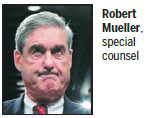Deal reached over Russia
Friend says Trump is considering 'terminating' special counsel
WASHINGTON - US senators have reached an agreement on legislation imposing new sanctions on Russia, including a provision that would prevent the White House from easing, suspending or ending sanctions without congressional approval.
The agreement, to be filed as an amendment to an Iran sanctions bill, is intended to punish Russia over issues including its alleged meddling in the US election last year, annexation of Crimea region from Ukraine and support for the government of Syria in the six-year-long civil war.
The Iran bill is due come up for a vote as soon as this week.
In addition to the provision setting up a process for Congress to review changes in sanctions, the measure would put into law sanctions previously established via presidential executive order, including some on certain Russian energy projects and debt financing in some industries.

The measure also would allow new sanctions on Russian mining, metals, shipping and railways.
The legislation is backed by both Republicans and Democrats, and is expected to easily pass the Senate.
It was introduced amid an intense focus in the US capital on relations with Russia, and investigations by the Department of Justice and congressional committees of whether Russia sought to influence the US elections to help elect Republican President Donald Trump, and whether Trump associates colluded with Moscow as it sought to influence the election.
To become law, the legislation would have to pass the House of Representatives and be signed into law by Trump. If Trump objected, some of its backers said they expected enough congressional support to override a veto.
"These additional sanctions will ... send a powerful and bipartisan statement to Russia and any other country who might try to interfere in our elections that they will be punished," Senate Democratic Leader Chuck Schumer said in a statement.
House and Senate committees are investigating Russia's meddling and potential links to the Trump campaign, with testimony scheduled on Tuesday from Attorney General Jeff Sessions. Special Counsel Robert Mueller is conducting a separate probe.
Russia has denied attempting to interfere in the election, and Trump has dismissed any talk of collusion.
The White House said last week it has no plans to scale back existing sanctions against Russia, as relations have soured.
Meanwhile, high-profile supporters of Trump are turning on Mueller, the man charged with investigating Russian interference in the election and possible collusion with Trump's campaign.
Trump friend Chris Ruddy, the CEO of Newsmax, has gone so far as to suggest the president was thinking about "terminating" Mueller.
Ruddy said in an interview on Monday with Judy Woodruff of PBS, "I think he's weighing that option".
Under current Justice Department regulations, firing Mueller would have to be done by deputy attorney general Rod Rosenstein, not the president - though those regulations could theoretically be set aside.
Rosenstein may be asked to address the issue when he speaks at a Senate subcommittee hearing on Tuesday.
Reuters - Ap
(China Daily 06/14/2017 page12)














